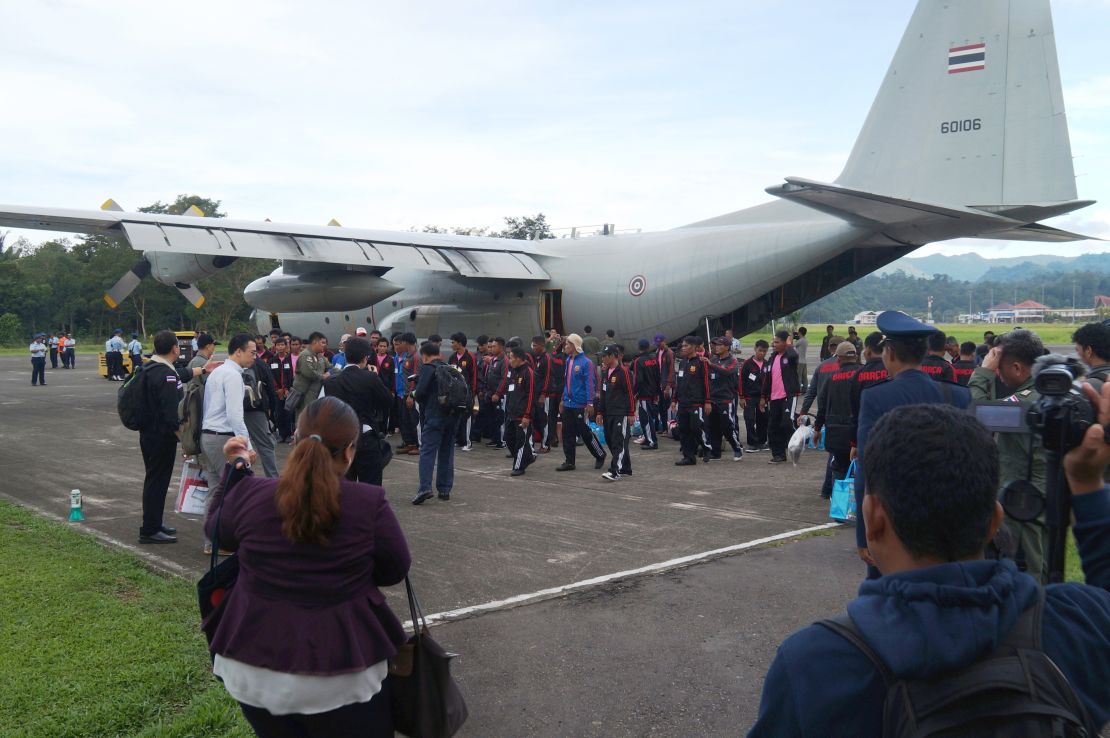Editor’s Note: Thai Prime Minister Prayuth Chan-ocha has told CNN that slave labor in his country’s fishing industry “is now severe” and that Thailand will act to tackle it. CNN investigates the scale of the problem in this special report.
Story highlights
Senasook worked for up to 20 hours a day in life-threatening conditions on a Thai fishing boat
He suffered regular beatings from the ship's captain
Rights groups estimate there could be up to 3,000 trafficked victims working on boats in these seas
The hours would be long and the work hard, but spending a year as a fisherman seemed like a good option to Samart Senasook.
Previous jobs as a security guard in Bangkok had been sporadic, so when a man known as Vee promised the 40-year old decent wages on a fishing boat he decided to take the chance.
Vee turned out to be a broker, a link in the chain of human trafficking that supplies the Thai fishing industry with thousands of migrant workers and turns many of them into virtual slaves.
Instead of a year on board a Thai fishing vessel, Senasook said he spent six, and was made to work 20-hour days in life-threatening conditions.
His unwanted odyssey only came to an end last month, thousands of miles from Thailand, on the eastern Indonesian island of Ambon.
The boat he was on was impounded by Indonesian authorities for suspected illegal fishing, with Senasook and his crewmates held in custody.
Six years a slave
Looking back on his ordeal, that he says lasted from January 2009 to March 2015, Senasook rarely saw land, as the boat he was on roamed further and further from Thai waters in search of increasingly scarce fish.
Its catch was part of Thailand’s multi-billion dollar seafood industry that feeds tens of millions in Europe and the United States.
Senasook describes his life on board as one full of intimidation, sleep deprivation and regular beatings from the boat’s captain.
“(The captain) kicked and punched me,” he said. “My nose and mouth were bleeding. I still have blood clotted in my teeth. My jaw hurts every time I chew.”
With no way to escape, he became suicidal.
“I was thinking of my family, my mother. There were times, I was about to jump into the sea to kill myself.
“My friend from the engine room held me back. Otherwise I would have been dead by now,” he said.
Senasook says the boat’s captain kept his and the crew’s ID at all times, essentially holding them captive.

When Senasook did finally get his hands on his identity card on Ambon, he was horrified to see it was in a false name. He had gone from being captive on board a fishing boat to being stranded on a distant island.
“There are many of my friends die in Indonesia. And their graves were with wrong names,” said Senasook. “Like, if I died, at my grave it would not bear my name but it would be someone else.”
In desperation, he wrote an open letter to the Thai Prime Minister asking for help. That helped to release him from Indonesian custody, but, isolated and penniless, he could not make his way home to Thailand.
He received a final payment of 1,750 baht ($53) from his ship’s captain, but was then told he needed to pay 20,000 baht ($615) for the agent fee that brought him on the boat in 2009.
The size of the problem: unknown
Eventually he received assistance from Thai-based Labor Rights Promotion Network (LPN) and was repatriated to Thailand last month.
He was one of the more fortunate ones. The LPN discovered a similar situation on the nearby island of Benjina, where the group says hundreds of other fishermen from across Southeast Asia were trapped and living in desperate conditions.
The rights group estimates there could be up to 3,000 trafficked victims working on boats in these seas.
“(The fishermen on Ambon and Benjina) have forged or no documents so can’t return home,” said the LPN’s Patima Tangpratyakoon. “The situation is severe.”
But the problem of modern day slaves fishing for seafood that ends up on dinner plates on the other side of the world goes much further than these tiny Indonesian islands.
The extent of the situation is hard to gauge. Thai government figures state that there are 145,000 working in its fishing industry, with 80% of those migrant workers, mainly from Myanmar, Cambodia and Laos. However, activist group Raks Thai Foundation suggests there are in excess of 200,000 trafficked, unregistered workers.

The exact number of fishing vessels is also unknown – official figures put them at around 57,000 – because registration is lax. The real number could be double that.
International attention, government response
The issue of slavery and rights abuses in the Thai fishing industry has become acute in recent years. As the global demand for seafood has increased, the Thai economy improved, so attracting workers to dangerous jobs on fishing boats has become more difficult.
Last year the U.S. State Department downgraded Thailand to the lowest tier on its Trafficking in Persons Report 2014, which can result in the withdrawal of international aid.
Last month the European Union called Thailand a “non-cooperating” country because of poor monitoring and control of its fishing vessels and the trade of fish and seafood from other countries into Thailand.
Unless it cracks down on the situation, Thailand faces a financially damaging embargo on its fish exports to the EU from October.
In response, Thai Prime Minister Prayuth Chan-ocha has declared combating human trafficking a national priority.
In a statement in March, he called on all government agencies to “clean up their houses.” Traffickers and government officials that have colluded with them “no longer have any room to exist in Thai society,” he said.
According to Thailand’s Department of Fisheries, new control measures are being implemented.
As well as inspections of fishing vessels, boats more than 30 tons in size that travel outside of Thai waters will have to be equipped with an electronic vessel monitoring system (VMS). Without it, the boats will not be given a fishing license. However, only around 6,000 boats in the Thai fishing fleet are of this size, according to the Marine Department.
Another new government initiative that came into play in April requires each fishing vessel to list who is on board, who it is licensed to, the name of its owner, and where it will operate before it leaves port and once it returns.
These “port-out, port-in” measures “will help enable us to reduce the risk of human trafficking, reduce the risk of force labor,” said Warapon Prompol, deputy director-general, Department of Fisheries.
Crew manifests were not previously required.
“For the Marine Department we can check only a certain type of vessel, a certain size, too. But now the government is trying to reduce the size (of the vessel) that allows that we can check them,” said Chula Sukmanop, director-general to the Marine Department.
He added that enforcement is made more difficult because all too often ships will change crew once they leave port.
Lack of enforcement, lack of clarity
While laws against human trafficking exist in the country – a new Anti-Trafficking in Persons Act was approved as recently as March – it has often been this lack of enforcement that has allowed exploitation of fishermen to continue.
“There have been laws that should penalize employers with penalties and not just the migrants themselves, but they’ve been rarely enforced in the past,” said Max Tunon, senior program manager for the International Labour Organization, who specializes in migrant workers’ rights in Southeast Asia.
“This is the most attention there’s been on the issue, coming from the highest level,” he added. “There’s a greater acknowledgment that corruption exists and that increasing regulation (of the industry) needs to be linked to the broader issues of migration.”
Exports by Thai seafood companies to the United States and Europe are worth around $2.5 billion annually, with Thai Union Frozen Products (TUF) one of the largest – and owner of the John West and Chicken of the Sea brands.
In a statement in March, Khun Thiraphong Chansiri, TUF’s president and CEO, called human trafficking in its supply chain “utterly unacceptable,” but said “we all have to admit that it is difficult to ensure the Thai seafood industry’s supply chain is 100% clean.”
Progress to combat the problems of trafficked workers and slave labor has been made thanks to market and trade pressure, said Tunon. But it’s still hard to see real change on the ground.
“It’s been a challenge for years and it will be hard to measure progress because there has not been much of a baseline from which to gather credible information on the problem,” said Tunon.
“The attention is now on the fishing industry, as it’s particularly vulnerable, but this could help better protection for migrant workers in sections that don’t have consumer or trade pressure, that aren’t so visible because they don’t feed into the global supply chain.”




